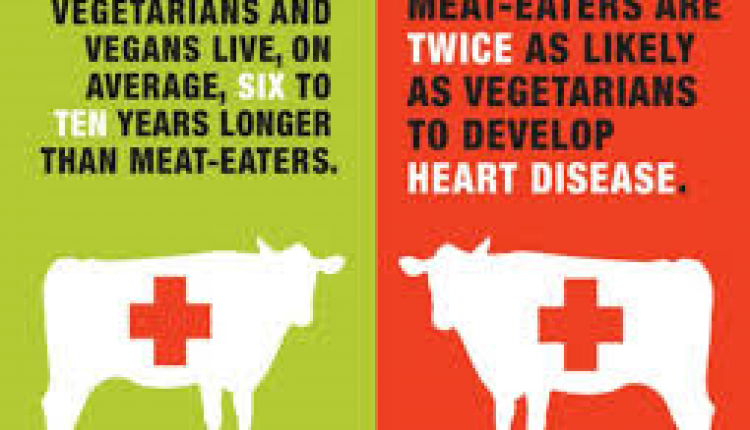Are meat eaters to be called killers? Is eating meat unhealthy in long term ?
Of course, meat eaters have their reasons for eating animals – most people do – but how often do meat eaters take into account the number of animals that they expect to eat in their lives? It’s an amazing number: 7,000.
According to Vegetarian Calculator, an online tool that breaks down your burgers into visceral numbers, these 7,000 animals expect approximately 11 cows, 27 pigs, 2,400 chickens, 80 turkeys, 30 sheep and 4,500 fish – per person. The tool is based on USDA data from 2008, in which the average American ate about three hamburgers a week.
When we talk about eating animals, we usually call them ready to eat: fillets, steaks, chops, schnitzel, nuggets, burgers. While meat eaters defend their actions for a number of reasons – from taste to (perceived) protein – few have actually started killing and dismembering their dinner.
This act of hunting, killing, and processing an animal before eating, but which is still practiced in some tribal communities around the world, connects the eater to eating in an important way that we have lost in modern culture. For one thing, there is respect. The whole animal is used and honored. And a wildly caught animal is not forced to live a terrible life amidst cement and steel and the echoes of their suffering neighbors. But most cultures, with the exception of tribes like the Inuit, supplement their predominantly plant-based diet with meat rather than making it the focus of their diet. They eat meat when plant sources run dry. They smoke, dry and heal it for long journeys. You can’t put hot pockets in the microwave or round change for a 99 cheeseburger.
Eating meat and other animal products (eggs, dairy, gelatin, etc.) is also a great Debbie Downer for the planet. We apply the same disrespect to the consequences we eat as to those we eat. The Vegetarian Calculator calculates both the CO2 and the number of animals consumed. This corresponds to a series of studies that have found that raising livestock is extremely problematic in reducing carbon dioxide emissions. The effects of climate change have a direct impact on people – and even claim the lives of people who have recently been hit by hurricanes. The world’s climate crisis can be directly linked to animal production. It is also predicted that this will lead to food shortages, poor crops and the spread of numerous diseases that are likely to cost the lives of countless people.
Eating animals is an inefficient way of eating when you measure calories in (rearing the animal) and calories in (the steak on your plate), regardless of our feelings about the inherent rights of the animal being eaten; It is ruthless for our friends, family and future generations.
But that’s how the vast majority of people today consume all of their food, especially meat. We just throw meat into shopping carts or go into burger joints without knowing where this burger comes from and what consequences it has for others. If that’s not murder, what exactly does it matter if meat is eaten?
Of course it doesn’t have to be that way. Advances in technology, from meaty plant-based foods to “growing” meat without the animal associated with it, are ready to solve many problems. From providing healthier and cleaner sources of protein that are better for the planet, to this excruciating ethical dilemma. Does eating meat make you a murderer? With these advances, it looks like it doesn’t have to be that way.
Is eating meat unhealthy in long term ?
This way you maximize the benefits and minimize negative effects
Here’s how to make sure you eat meat in a way that’s healthiest for you and the planet:
>Choose unprocessed products. Unprocessed meat is always healthier for you than processed varieties.
>Try organ meat. Add organ meat to your diet to take advantage of the high nutrient content.
>Minimize cooking over high heat. If you are grilling, grilling or using any other method with high heat, wipe off the drains immediately and avoid overcooking or charring.
>Consume unprocessed plant-based foods. These are rich in fiber, contain valuable antioxidants and contribute to a balanced diet.
>Choose organic meat from small farms. This is more environmentally friendly and better from an ethical perspective.
>Choose grass-fed beef. Cattle that feed on grass rather than grain naturally produce meat that contains more healthy omega-3 fatty acids and antioxidants (78 Trusted Source, 79 Trusted Source, 80 Trusted Source).
Summary : To maximize benefits and minimize risk, choose unprocessed meat, avoid over cooking, include plant foods in your diet, and choose organic or grass feed whenever possible.
The bottom line about eating meat
Unprocessed and properly cooked meat contains many nutrients and can have health benefits. If you like to eat meat, there is no compelling health or nutritional reason to stop it.
However, if you don’t feel right about eating animals, you can stay healthy by eating a balanced vegetarian diet.
Ultimately, it is a personal decision whether you eat meat.

